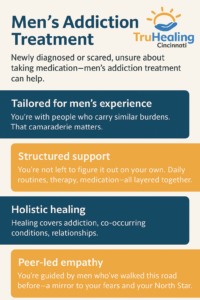I never thought I needed help—just a stronger bottle. But my anger wasn’t just a short fuse anymore. It was an inferno. The day I walked into TruHealing Cincinnati for men’s addiction treatment, I realized anger and addiction had eaten away my life. This blog is for you—if you’re newly diagnosed or unsure about taking medication, if you feel fear under your skin and distrust in your breath. You’re not broken. You’re beginning.
My story is one of rage, regret, and ultimately, recovery. But hope threaded through it the whole time. Let me tell you how I found my way back.
I Thought Anger Was Just Part of Being a Man
From childhood, I learned that showing emotion was weakness. Crying? Not an option. Talking about feelings? Definitely not. Anger was my voice—and it served me for a long time. That voice helped me secure a good job and a reputation for toughness. I thought I was living on my terms.
But as my drinking escalated, so did the fury. It wasn’t directed—it just spilled everywhere. One night, I snapped in the grocery store at a cashier who rang up an extra item. Another time, I lashed out at my teenage son for something small—something he didn’t even remember. But I remembered. I remembered every time I lost control.
I’d tell myself I was just stressed, exhausted. I’d take another swig to calm down. But things only got worse. I became a stranger to my family. And, worst of all, I became a stranger to myself.
Facing the Diagnosis — and the Fury
When they first told me I had addiction, I felt relief mixed with shame. Relief—because finally, I wasn’t crazy; I wasn’t weak. Shame—because I had let it get this far. I thought addiction was about drugs or alcohol—but not me. I was just angry.
The truth is, addiction and anger are two sides of the same coin. I didn’t use alcohol to get drunk. I used it to smother emotions I couldn’t handle. Emotions for which I had no name. Anxiety, grief, shame—they were all stuck under the surface, and every drink pushed them deeper. The harder I drank, the louder my anger roared to fill the void.
When I heard the phrase men’s addiction treatment, something shifted. Maybe that’s what I needed. A place to learn not just sobriety—but myself.
The First Days: Detoxing More Than Chemicals
Walking into TruHealing, I braced for withdrawal pain. I expected tremors, sweating, sleepless nights. I didn’t expect to detox from excuses and denial. Every session pushed me deeper into self–exam.
One counselor asked me, “If you could name the emotion behind the anger, what would it be?” I froze. I didn’t know. I took a deep breath. And I whispered, “Loneliness?” I’d been angry and drinking not because I hated people, but because I didn’t want them to see me bleeding inside.
In those early days, I started therapy, group discussions, medication checks (anxiety meds to calm the tremors of panic). I got real about how long I’d been walking in circles. I began to understand why medication didn’t scare me—it saved me.

A Room Full of Shared Battles
That first group therapy session was terrifying. Ten guys; ten backgrounds; one thing in common—we were lost. We didn’t talk about addiction first. We talked about what we were afraid of losing: our trust, our families, ourselves.
They told stories: a dad who nearly missed his daughter’s recital because he was too drunk to drive; a veteran who kept waking up in sweat-drenched nightmares. I listened, and I realized something crucial: these men weren’t weak. They were wounded. And they’d come to heal.
We talked about what anger covered. Feelings of failure. Regret. Grief we were too proud to call grief. I heard one man say, “I’d rather explode than feel weak.” And I thought: that’s me. But when he kept talking—about forgiveness, small wins—I saw a path.
The path was paved with structure: check–ins, sharing circles, exercise, journaling. With each step, I built trust in the process—and with it, trust in myself.
Understanding Anger: Not an Enemy, But a Signal
One of the most powerful lessons I learned at TruHealing Cincinnati was this: anger isn’t a bad thing. It’s a signal. A red flag telling me to pay attention. It means I care. It means something matters. But until I learned what it was trying to tell me, I used it like a weapon.
In our counseling sessions, I practiced stopping before I reacted. I learned to ask: What am I feeling beneath the rage? Hurt? Fear? Exhaustion? And then, I started saying it out loud.
“I’m scared I can’t provide for my family.”
“I feel ashamed I messed up my son’s trust.”
Simple words. Life-changing practice.
Medication and Mindfulness: Tools, Not Crutches
When I found out I had anxiety and depression alongside addiction, I felt scared. I believed that men were supposed to handle things. But the medical team at TruHealing Cincinnati explained medication as a tool—like a hammer helps drive a nail. You can’t build a house with just your hands—and you can’t rebuild yourself without help.
My meds didn’t change me overnight, but they gave me space. Space to learn that if I felt rage, it was often masking deeper pain. With counseling and mindfulness, I learned to breathe through the noise. I learned that every emotion could be observed, not owned.
Rebuilding Trust—With Others, With Myself
Men’s addiction treatment isn’t a solo journey. One of the most meaningful moments was writing a letter to my family—not to excuse my behavior, but to explain it. I read it in front of the group, and my voice cracked. My wife cried. My teenage son looked surprised.
It wasn’t a perfect moment. My words stumbled, because admitting fault never is. But after that, we started going to family counseling together. We rebuilt. Belief by belief, trust by trust.
Rebuilding trust takes time. I know that. But I also know this: something shifts when you say the words out loud. You stop hiding. And then, you stop hurting as much.
Life After Treatment: Calm, Connected, Clear
Now I’m ten months sober. I still feel anger—but it doesn’t blind me. I notice it rising. I see it. I name it. And I choose how to act on it.
My mornings begin with a few minutes of mindfulness. My afternoons include regular check–ins with a peer support group. My evenings are simple dinners with my family—no bottle waiting under the sink.
That’s not just sobriety. That’s healing. That’s men’s addiction treatment giving me tools for clarity, connection, peace.
Why Men’s Addiction Treatment Works for the Scared and Newly Diagnosed
- Tailored for men’s experience. You’re with people who carry similar burdens. That camaraderie matters.
- Structured support. You’re not left to figure it out on your own. Daily routines, therapy, medication—all layered together.
- Holistic healing. Healing covers addiction, co‑occurring conditions, relationships.
- Peer‑led empathy. You’re guided by men who’ve walked this road before—a mirror to your fears and your North Star.
FAQs
Q: I’m scared of taking medication. Does men’s rehab push pills on me?
A: No. Medication is offered as a tool—never mandatory. At TruHealing Cincinnati, your concerns are honored. You work with medical professionals to find the right balance. It’s your treatment.
Q: Will I just be stuck talking about feelings?
A: No. Sessions combine talking with real‑world activities—mindfulness, exercise, journaling, job‑skill building. You heal with your head and your hands.
Q: Is anger really part of addiction?
A: Yes. Anger often hides fear, shame, grief. Substance use numbs the deeper pain—and leaves only the rage. Addressing both sides helps break the cycle.
Q: What if I relapse after treatment?
A: Relapse is a risk—but it doesn’t erase your progress. Aftercare plans include ongoing counseling, peer groups, medication check‑ins. You don’t restart—you learn and continue.
Q: I don’t live in Cincinnati—does that matter?
A: TruHealing Cincinnati supports men from across the region. If you’re looking for men’s addiction treatment in Lexington, Kentucky, or men’s addiction treatment in Louisville, Kentucky, they’ve got pathways to help you start in Cincinnati and build support near home.
Your Next Step—And a Word of Hope
If you’re newly diagnosed, angry, scared, unsure about medication—you’re sharing a room with me when I first walked in. I was nervous, ashamed, uncertain. But I was also hopeful. I wanted to live differently.
Men’s rehab didn’t just help me stop drinking. It helped me learn who I am beneath the rage. A man who loves deeply. Who hurts deeply. But who now knows healing is possible.
You don’t have to face the anger alone. You don’t have to figure this out by yourself.
Call (888) 643‑9118 or visit TruHealing Cincinnati’s men’s addiction treatment page to learn more about our men’s addiction treatment services in Cincinnati, Ohio. Take that step today—you can build a life that feels full again.


